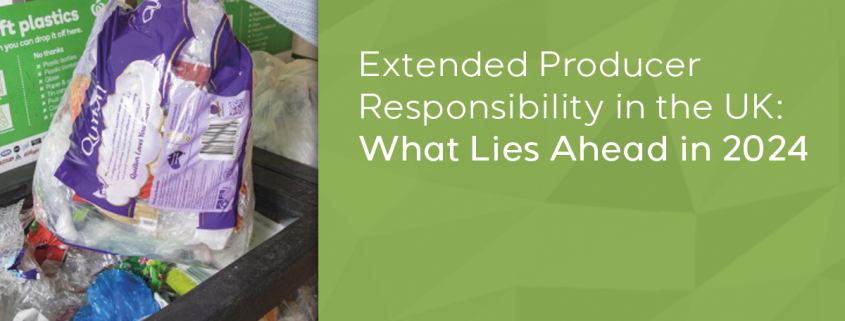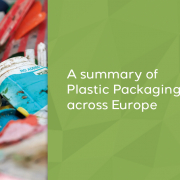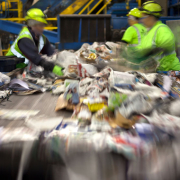The UK government’s Extended Producer Responsibility (EPR) plans are set to reshape the landscape of waste management and recycling in the country. Despite opposition from some industry groups, the Department for Environment, Food and Rural Affairs (Defra) is pressing forward with the EPR scheme, which is still on track to be implemented in 2024.
What is EPR?
EPR is a system designed to make firms that supply household packaging more responsible for the costs of dealing with packaging waste. This shifts the financial burden away from councils and taxpayers, encouraging businesses to increase their use of recyclable materials. The EPR system aims to protect the environment from waste, promote resource efficiency, and move towards a more circular economy.
Data Collection and Reporting
Data collection and reporting are key components of the EPR system. Obligated businesses, including many in the packaging industry, must collect data for the revamped packaging producer responsibility system, and pay for the cost of waste collections.
According to the latest information available to Skymark, data will be reported during 2023 using the new data capture format covering household and non-household data. The data will then be used to calculate the estimate using a cost estimator tool for the payments, which will be billed in April 2024 and due to be paid in Q3 2024.
Defra has confirmed that obligated packaging producers in England, Northern Ireland, and Scotland must collect information on the amount and type of packaging they have supplied during 2023. Wales will follow shortly. Producers with a turnover of greater than £2 million and who handle more than 50 tonnes of packaging each year must also report this information to the Environment Agency twice a year. The first reports must be submitted from 1 October 2023.
Preparing for EPR
At this stage, businesses should assess their current data submission format, review all items of eligible waste, assign the relevant type, origin, and material categories, and change their template based on this. This is important as some organisations may be required to not only submit data to DEFRA, but also downstream to their supply chain depending on their position in the chain. By adjusting the reporting format, it will be easier to split those sections out.
Opposition and Cost Concerns
Despite the government’s commitment, the EPR system has met with opposition from industry groups such as the British Retail Consortium (BRCGS), who argue that the EPR and the deposit return scheme (DRS) combined will add around £4 billion in costs to retailers, which will be passed down the line. The Food and Drink Federation, whose members include large producers like Coca-Cola and Unilever, called on ministers to pause the plans, which they claim would add £60 to shopping bills.
However, Defra has listened to feedback from industry and reduced its business waste proposals from £2.7 billion to £1.4 billion. The total net cost of the new EPR system is expected to be around £1.7 billion, a figure significantly lower than early estimations of £2.8 billion.
Looking Ahead
As the 2024 EPR deadline approaches, businesses and industry groups are expected to continue lobbying for changes and clarifications. However, the UK government remains steadfast in its commitment to implementing EPR as part of its wider strategy to protect the environment and promote a more circular economy.
Deep Sagar, Chair of the Advisory Committee on Packaging, has pointed out that packaging materials that are not recycled back into new packaging harm the natural environment. EPR is expected to reduce such waste and encourage goods producers to pay for the collection of all packaging waste, thereby stimulating them to reduce or recycle more packaging. Sagar anticipates that EPR could be a game-changer, reducing the impact packaging has on the environment by regulating material use and increasing recycling.
The EPR system is a part of wider waste reforms introduced by the UK government, which also includes bans on more single-use plastic items, a deposit return scheme for drinks containers, and consistent recycling collections for households and businesses, on top of targets for recycling packaging waste.
The government’s EPR plans are in line with its 2018 Resources and Waste Strategy, which outlines how it intends to preserve material resources by minimizing waste and promoting resource efficiency. The revenue generated from the EPR scheme will support better local council services and ensure that households can recycle the same packaging materials.
In conclusion, the implementation of EPR in the UK is a significant step towards achieving a more sustainable and circular economy. Despite concerns and opposition from certain industry groups, the government stands firm in its belief that the EPR will help preserve material resources, minimize waste, and promote resource efficiency. While the transition may bring challenges, it also presents opportunities for innovation and improved environmental stewardship. As the 2024 implementation date approaches, businesses are advised to prepare accordingly, ensuring they understand their obligations and are ready to embrace the opportunities this major policy shift offers.












